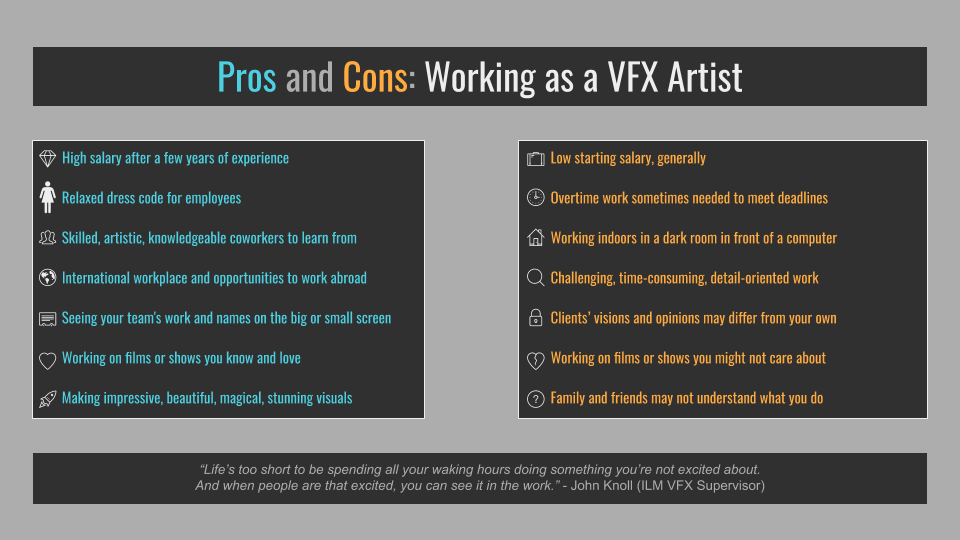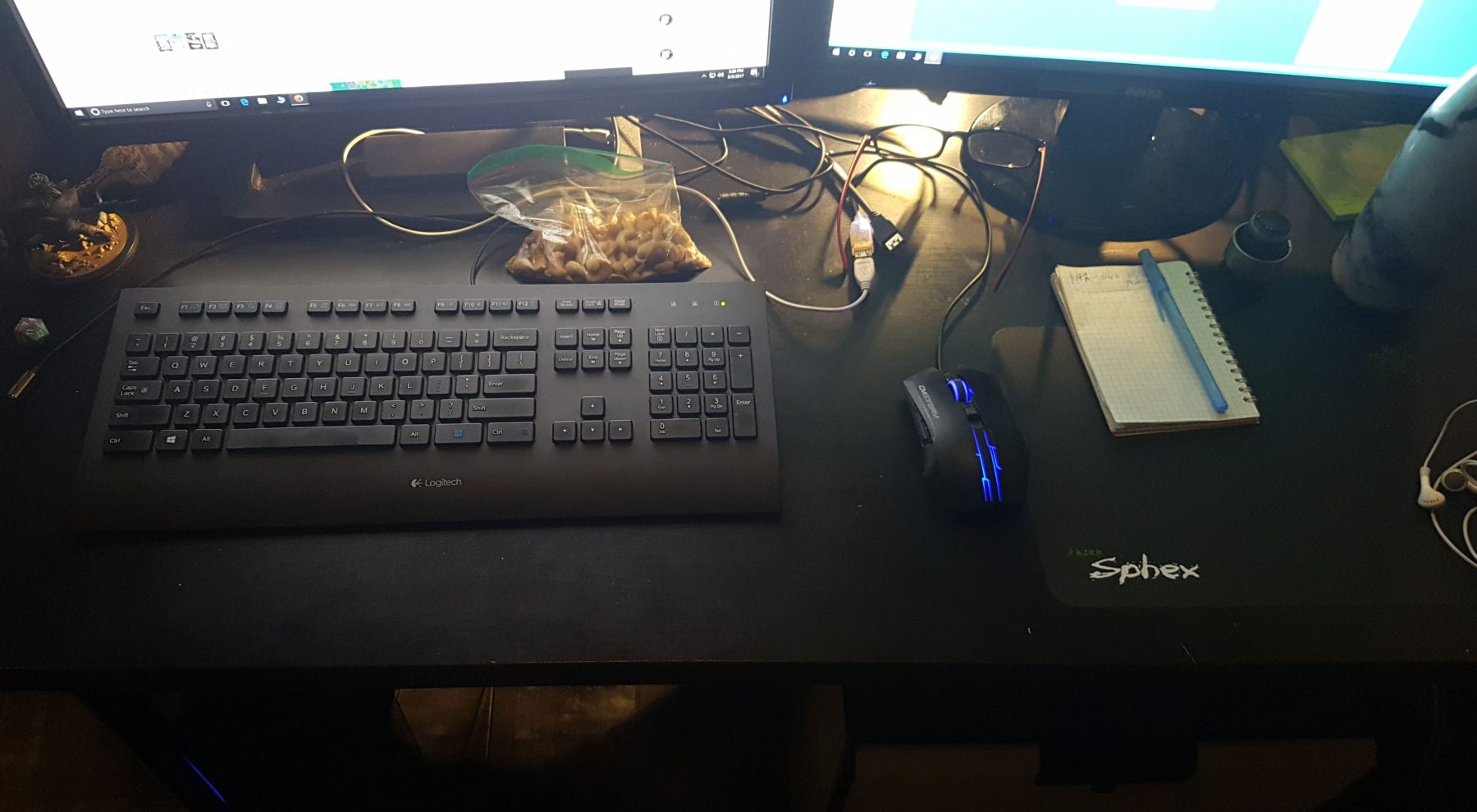
VFX Life
Love, VFX, and Relationships
Dear Andrew,
I’m a VFX Artist and my partner isn’t. I’ve run multiple simulations for our relationship, trying to create the ideal working model. But sometimes I feel like this industry is rigged against us. I was wondering if you could shine some light on how to composite a healthy work-life balance and relationship with my partner.
Dear VFX Artist,
I am not an expert on this topic, but have learned a few things from personal experience and others who are smarter than me. Relationships require a lot of time and effort, if you want to have a strong relationship, and each one is as unique as individuals. It is such an important part of life to consider, and writing to you has made me consider how much I still have to learn.
I found a partner outside of VFX and we got married. She doesn’t completely understand or have much enthusiasm for VFX, and that’s ok. I don’t need that in our relationship. I can discuss VFX with my friends and colleagues. My partner once fell asleep in the theatre while watching a movie that I worked on (it had nothing to do with my work and everything to do with the script and acting). On multiple occasions she waited in her car outside the studio late at night for hours until my shot was approved to drive me home. This is far more meaningful and impressive to me than being able to stay awake during a Vin Diesel film. If you can find someone willing to do that for you, love them and never let go.
Here are some practical tips that have been helpful for me (and could be for you).
1. Ask if your partner wants to watch a movie that you worked on. Nobody likes to be forced to watch something.
2. Ask if your partner minds if you pause or interrupt their viewing experience to point out which shots you worked on. (Kayla & Ray’s Tip: You can squeeze your partner’s hand each time your shot appears on screen if they are ok with that).
3. Try to be home in time for dinner. If you’ll be late, tell your partner as soon as possible. It can be difficult to estimate how long our work takes to complete. When in doubt, overestimate how late you will be.
4. In the gaps between contracts and working overtime, give your partner extra care and attention.
5. Try to do at least one fun or playful activity together every week. It can be different each time or you can pick something you both like and make it part of your routine.
6. Take care of your own health and well-being. If you aren’t sure how, consult experts. Doctors, dentists, therapists, counselors, nutritionists, personal trainers, yoga or Pilates instructors, massage therapists, etc., can help you become a better YOU. A better YOU is a better partner.
7. Balance is key. Throwing all your energy into work can lead to exhaustion. Throwing all of it into pleasing your partner can lead to resentment. Throwing all of it into yourself is the fastest route to loneliness (and unemployment). You’ve already scheduled time for work. Why not schedule time for your partner and time for yourself (self-care, hobbies, time with friends, etc.)?
8. Protect the time you have with your partner. To make it quality time, I recommend putting your phone on vibrate or silent. You can focus on the same thing (i.e., watching a movie together), but your partner would probably appreciate having your attention on them just as often, if not more. Quality time is more important than quantity, though you need to have enough of it that both of you are satisfied. This requires trial and error, shuffling around your schedule, and sometimes compromise.
9. Ask questions. Listen to your partner. Communication is vital. Make sure they feel heard and cared for. Be clear about what you want and need. Double check that you understand their expectations of you. Yes, you are a visual artist, so speaking and listening might not be your top skills. But this is so important and so good for relationships. It’s great in our work to have a problem-solving mindset, but your partner may not want solutions. They might want to be heard and have their feelings validated. They may already know the answer. For example, if you lost one day’s work because you forgot to save, you wouldn’t want your partner to say: “Why didn’t you save your files? Next time you won’t make the same mistake, right?”
10. Find things that make you both laugh. Savor those moments.
I personally believe that love isn’t a feeling, it’s a choice: to will the health and happiness of another through our words and actions. And it’s a choice we are presented with every day. Choose love!
Kind regards,
Andrew
I’m in Love with a VFX Artist
Dear Andrew,
I have fallen for a VFX Artist, but not knowing much about VFX, I sometimes find we have difficulty understanding each other. I love my partner very much and want us to grow closer, but to be honest, I’m not too interested in VFX. I worry this could become an obstacle in our relationship. Could you please give me some advice?
Best wishes,
Normal Human
Dear Normal Human,
Congratulations! It’s uncommon for VFX Artists to date outside of their industry, so the fact that you’ve met one and developed a serious relationship is an accomplishment! VFX is a time-demanding job that involves working overtime and self-study outside of work. That is why many VFX Artists may only date within the VFX community. It makes it easier to understand the choices and work of their partner. Plus, it’s difficult to meet people outside of work when you spend so much time in front of a computer.
Does your VFX partner exhibit any of the following characteristics?
1. Works long hours, sometimes losing track of time
2. Has trouble completing basic mental tasks after work, moves and speaks like a zombie
3. Inability to stop watching a movie until the end of the credits
4. Wants to have a long conversation about the movie immediately after watching it
5. Frequently complains about how bad movies are, despite spending so much time watching them
6. Always (or never) wants to go outside on weekends
7. Stares too long at people, animals, objects, reflections, shadows (or takes a lot of photos of them)
Don’t worry, these strange behaviors are quite common. Of course, everyone is different. Yet every relationship has obstacles, highs, and lows. Your friends only appear to have flawless relationships on social media. People only share what they want to share, and images can be manipulated (that’s kind of what your partner gets paid to do). Rather than trying to avoid relationship problems, it helps to be understanding and forgiving towards each other, so that when there are issues, both of you can work through them.
I cannot claim to be a relationship expert. I can only speak of people I know and my own experience as a VFX Artist married to someone working outside the field of VFX. We are living proof that there are couples like you and your VFX partner who can make it work. Whether your relationship grows stronger will probably depend less on your interests and more on your priorities, values, and how you both deal with obstacles in your lives.
My partner helps me stay grounded and keep things in perspective. I’ve learned by her example how to take better care of myself physically, mentally, and emotionally. This isn’t usually taught or considered much in a VFX workplace: it’s expected you know how and will take care of yourself. In an industry that is subject to many quick changes and developments, the stability you can provide will be invaluable. Your VFX partner’s job is essentially about trying to make the client happy by finding quick ways to change their project to better match their vision (or to hide all the mistakes). So, if you ask your partner to wash the dishes more carefully and their emotional response seems way too big, this might be a sign that they’ve reached a tipping point of people being unsatisfied with their work from that day. In other words, the reason they’re upset could have little to do with you. If you know they’ve had a hard day and are extra supportive and affirmative of your VFX partner after work, they will heal faster and appreciate you even more.
What do you want from this relationship? What does your partner want? The answers to these questions will guide you in supporting each other. Learning about your partner is a never-ending journey, but one that makes all the difference, because to know someone is to love them, and vice-versa. This doesn’t mean you need to know exactly what they do each day at work. Asking them how their day was, how they feel about a certain person, or to tell you about their goals and dreams will tell you far more about them as a person than trying to fully understand their job.
Kind regards,
Andrew
10 Things to Have at Your Desk as a VFX Artist
You have just started working in a visual effects studio. What do you keep at your desk? You look around and see what other people have at their desks. Here are some things that you are likely to see…
1. Snacks – The energy-giving, friend-making companion. Healthy options: nuts, fruit, carrots, sliced cucumber. Just don’t leave them in the open overnight or you might attract insects, pests, or hungry but shy coworkers.
2. Mug/Tumblr – Choose a unique one so everyone will know it’s NOT theirs, but also one you won’t mind seeing someone else use if that happens. I personally recommend Swell bottles, as they keep your beverages hot or cold for a long time. Stay hydrated.
3. Humidifier – Breathe clearly, avoid dry skin, and pretend you have a dragon.
4. Anti-Fatigue Glasses – Embrace your inner geek and protect your precious eyes. Take them off for color-correction work since they block out a percentage of blue UV light. I recommend ones that block 40%, rather than 20 or 70. Mine are from: Spektrum.
5. Medicine – Always have what you need and keep pain/headache and nausea relief just in case. The studio may not have what you need. Check expiration dates too.
6. Toys/Figurines/Vehicle Models – Not to play with. You are a serious professional so you simply look at these occasionally for inspiration. They’re good icebreakers for conversation too.
7. Phone Charger – Because you’re not sure how you would survive if it died.
8. Headphones – Earbuds if you need to interact with others often at work, noise cancelling if you need to avoid distraction.
9. Pen and Paper – Even if you have a photographic memory, writing stuff down shows others that you care about what they say. Plus crossing things out on 2-do lists feels so good. Good to have at least 2 pens. Some studios provide you with paper.
10. Lens Cloth – to clean your glasses and/or monitors. Some studios provide monitor wipes.
